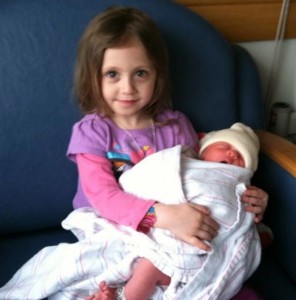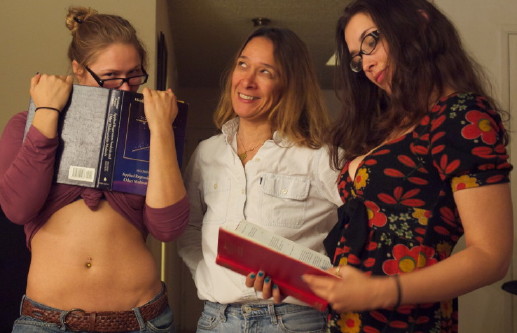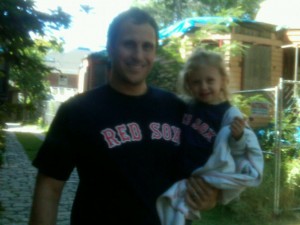Interview with a Vampire Researcher: What I was doing at JSM
I hate Buffy the Vampire Slayer and the entire Twilight Series. This came about over the course of a week when my daughter had strep throat and was watching approximately 4,789,362 episodes of vampire shows in the living room, which is just down the hall from my office. Thus, when Brenda Osuna from USC asked me to be a discussant on a panel of researchers involved in statistical analysis comparing viewers of Buffy the Vampire Slayer and Twilight, my first thought, and this is verbatim, was
“That has got to be the dumbest idea I have ever heard.”
However, I want to inform you of two things. First, as much as we statisticians love to quote the Washington Post article that said statistics is the next sexy profession, my older daughters mocked that greatly. Here they are trying to emphasize the lack of sexiness of the statistics profession.
And even though I truly do hate Buffy, Bella and anything else vampire-related, when I told my youngest daughter there I was going to be gone to a statistics conference, she groaned “Boring!” but then when I told her that I was going to be on a panel on Buffy the Vampire Slayer and Twilight, she immediately perked up and said, “What did they find out?”
This is relevant because the middle child in front of the blue M & M has been in every advanced math class since the age they started offering advanced classes in middle school, tested a year above average in math and just received a scholarship to a top prep school. The one showing her pierced navel in the top photo attended a science magnet and whipped through all of her high school math problems like someone doing speed reading. These are the kind of people we want in statistics. They are prime candidates.
Throughout this week at the conference we have heard repeatedly about the need to stoke the pipeline that there is an unmet need for statisticians, particularly domestic statisticians. We are filling our graduate programs with international students and that is going to cause a severe shortage down the line. Some areas, for example anything with a high security clearance, require citizenship.
For crying out loud, STUDENT isn’t an occupation we should be out-sourcing in this country!! What the hell is wrong with people who don’t get this??
Most of the “solutions” I hear for the inability to fill graduate – and even undergraduate – programs with our own students push the problem down the road.
We need to start in high school to get kids interested in statistics so they major in math and then go on into our graduate programs. BUT …. If they are going to major in math, they need to do better in high school, so let’s intervene in middle school, no, elementary school, heck, let’s go back to birth!

We’ll all be old(er) and retired by the time these “solutions” work – or more likely, don’t work, since they have not worked in the past 25 years that I have been hearing them, and as all good statisticians know, the best predictor of future behavior is past behavior (apologies to Taleb aside) .
I recommend we just stop fooling ourselves. Stop the bullshit. The only thing we really have control over are the graduate and sometimes undergraduate students that we teach. I get really tired of solutions that address every part of producing future statisticians except for the part that we ourselves control.
I was unpleasantly unsurprised when I spoke to some employers at JSM about students I knew were soon graduating who had 12-20 credit hours in statistics but did NOT have degrees in mathematics or statistics. The response I got was,
“We-ell. We might consider them if they don’t have a mathematics degree, but I don’t know.”
What. The. Fuck? Are you really that fucking stupid?
Why on earth are we writing them off? If you want to get good people, do it the American way – steal them from other people! When a company needs new engineers, managers or computer programmers they don’t wait for someone to give birth to them, they go out and hire them away from other people. When there was a shortage of computer programmers in the 1970s we hired away anyone who could program a computer without waiting for them to finish graduate school or sometimes even their undergrad degree.
So, let me get this straight — instead of taking someone who already has a bachelors or masters degree, who obviously has some motivation and academic ability, who has all of the core courses completed and more statistics courses than many majors, who has programming experience with real data, who has published papers and presented at conferences quantitative research – your plan is to encourage kids in high school to major in statistics? That’s what you’ve got? Seriously?
How many people, when they were little said,
“When I grow up, I want to be a statistician?”
 None of the statisticians in the audience raised their hands when I asked,
None of the statisticians in the audience raised their hands when I asked,
“Was this your Plan A?”
Why on earth, then, do we demand that of our students?
Cynthia, the first speaker on the panel, originally began with a qualitative study of vampire media. One quote from her paper stood out.
“Clearly, combining good looks, rebellious power, and elusive sexuality can be a path to success in reaching a young adult audience” (Robillard, 2009).
I confess, on reading it, my thought was
“Ick. I hate this crap. How is this academic?”
And yet ….. when we teach statistics there are tons of examples on baseball statistics, yards run in football, and I have ZERO interest in that.
(So much so that last night when we were sitting at the UFC fights in the front row and the very nice man next to me, when I asked if he was a fighter said with some surprise,
No, I played football for 15 years. I retired after my team won the Superbowl and went into television.
I told him that I didn’t really watch TV or football but I had at least heard of the Superbowl so he must be very good if even I had heard of it. For some reason, both he and my daughter found that hilarious. Hmph.
Anyway, my point is that if we can use sports statistics to try to make statistics more relevant to students, why not statistics on vampire shows. If you add up the revenue from all the vampire books and TV shows, I don’t know if it rivals baseball but it sure is not a trivial market. According to Statistics Brain, the Twilight Series franchise alone is closing on $5 billion – yeah, that’s billion with a B.
So …. the first paper on the panel was the senior statistical consultant who oversaw the whole project. The second was a qualitative researcher (Cynthia) who then shifted to a quantitative study. Yes, she is a beginning quantitative researcher, and in her paper she discussed many of the mistakes she made, false starts and what she learned – the need for random sampling, better designed questions, changing data from unstructured to structured so it could be analyzed, potential bias, overlapping populations, categorical data analysis. It was a quite impressive list. Is she even a junior statistician yet? No. However, what she IS, is much more interested in statistical analysis than she was before and full of ideas for how to revise her research and extend it in the future. She certainly has far more potential to become a statistician than the average high school student or undergraduate statistics major because she already has learned a lot of very useful information for anyone who is going to work in the field.
This is really not rocket science – if you want to get a more diverse group of students, you need to study more diverse topics and recruit and train those students in diverse ways.
I think we’ve been really stupid in the U.S. in mathematics and statistics departments. According to Dr. Suresh of the National Science Foundation, in 2007, less than one-third of engineering Ph.D.’s GRANTED BY AMERICAN UNIVERSITIES went to American citizens as did less than half of Ph.D.’s in the physical sciences. He did not give specific percentages for statistics or mathematics but you don’t have to go to many conferences to see that we have been filling up our programs with international students.
Rather than changing our programs to attract and retain students from the U.S. , we’re keeping our programs the same and recruiting students from thousands of miles away. You can talk all day long about how that is a good thing because we’re so great, we’re attracting a global audience, globalization is a good thing, etc. etc. One of my colleagues told me that the answer was obvious, look at the international students coming in and how hard they work, American students are entitled.
That is COMPLETE bullshit.
I teach students who work an eight-hour day, then come take classes for six hours in the evening, in things like Advanced Quantitative Data Analysis, where they learn SAS programming along with inferential statistics. Does that sound lazy and entitled to you? I’m not saying there aren’t lazy, entitled students in the U.S. I am saying I very seldom see any in the graduate program where I teach.
What I do see is students who are challenging and questioning, who are reluctant to spend four years or eight years studying theoretical distributions and trying to create some new statistic that is a trivial improvement over the prior methods. I see students who want to study and research topics that interest them. That is not a bad thing. In fact, that is what I love about my work, is that I DO get to address fascinating problems every day. So, Brenda is right – we should recruit intelligent, articulate, hard-working graduate students from other fields into statistics as another optional path.
But I still really hate Buffy. And Ella. And any other vampire-related person or thing.



The math major comment isn’t universal. I graduated in the early ’70s with Biology Major and a Chemistry Minor, the usual Pre-Med combination. UNC-CH offered me a fellowship and I eventually earned a Ph.D. in Biostatistics. I never published in the Annals, but did manage a few in JASA, Biometrics and others before I left academia. There were others at UNC-BIOS that were also non-math majors. I wasn’t the only Biology major there.
Thanks for the perspective, Bill. There was also someone who gave me her card after my talk and said she was hiring.
Still, like me, you graduated in the 1970s. Do you think you’d get that same fellowship offer today? I have no idea, that’s why I’m asking, it’s not a rhetorical question.
i love you
Oh come on, reading _Feller_ to other people’s babies while still in the womb has got to work, right?
Another place we can affect this is on the job training. We can cross-train scientists into SAS programming positions, which can then lead to statistician positions (perhaps when coupled with some tuition reimbursement program) at least in the drug development industry, and I suspect in other industries as well.
I don’t know about fellowship money these days, but I have a couple of biology or psychology undergraduate/Biostat or Stat masters working for me right now, and they are doing quite well. I have found the science or engineering undergraduates are quite effective in understanding the science and engineering problems encountered in day-to-day consumer R&D.
I haven’t been able to afford to hire the mixed background Ph.D.s that I have tried to recruit. The Pharma and BioTechoffer salaries I can’t match.
Well, Bill, you are obviously a very wise man. And I say that without a trace of sarcasm. I think you are dead on about science and engineering undergraduates understanding consumer R & D. Some schools also have fairly intense quantitative programs for business and social science majors with a lot of stats and operations research as well. On the other hand, some have very, very little quantitative methods. So, business and social science graduates may be another potential source of recruits to the field – and that is what Brenda was doing.
As for the Pharma and BioTech salaries – I did that for a while. I didn’t find it that interesting so went into more diverse areas of consulting. In the end, I probably ended up making the same amount of money, but not at first.
no not dead sure , try other statement ,why am i writting you good luck in life everthing that you do try my voice love to rr go ahead
Interesting! I am not sure about the States, I am currently living in Australia and my partner has been telling me about his research about higher education that the government hasn’t been giving enough funding to the universities and that is why unis have to seek their own funding from international students.
Funny enough, I myself was once an international student in Aus and now a statistician. At least, the US gov realised that there is a demand / need for statisticians, not like here in Aus 🙂